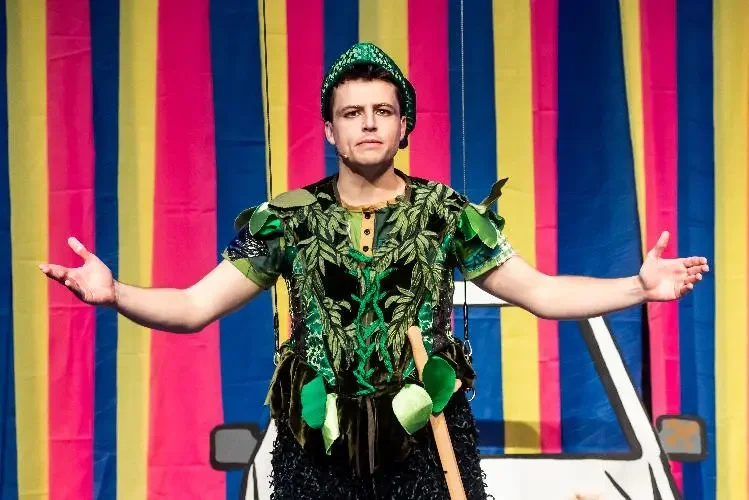Period Parrrty at Soho Theatre (Dean Street) Review
Rani Moorthy Tanvi Virmani and Elizabeth Green in Period Parrrty. Photo by Ikin Yum
Written by Greta for Theatre & Tonic
Disclaimer: Gifted tickets in exchange for an honest review
Content warnings: depiction and discussion of gender dysphoria. Discussion of transphobia, homophobia and genocide
Period Parrrty is a fresh coming-out and coming-of-age story, a meditation on what it means to live truthfully within inherited structures; and it’s bloody funny (pun intended).
Krish is fifteen when they get their first period. Within their Tamil heritage, this milestone warrants a lavish Period Party, a celebration of fertility and a public acknowledgment of a girl’s readiness for womanhood. But Krish is not a girl. Their understanding of their non-binary identity is unclouded (also thanks to a powerfully balanced performance by Elizabeth Green); through their eyes, we too can look at the prospect of their period party as a site of, at the very least, profound dissonance.
Period Parrrty grapples with a particular kind of tension: Krish likes who they are, but struggles to communicate it to their parents, particularly their mother. The difficulty is not in self-understanding but in translation. The Tamil language doesn’t seem to have a word for “non-binary,” and the absence of that word becomes a chasm. How can one articulate an identity that has no apparent linguistic or cultural equivalent? The question resonates far beyond Krish’s individual experience, speaking to the broader intersections of identity, language and belonging.
The Period Party itself becomes a vivid metaphor. Its saturated femininity - the clothes, the expectations, and the taboos - embodies the social script Krish is expected to perform. What others may see as reaching towards adulthood, for Krish is a step in the wrong direction, confirming a role they will never inhabit. The production skilfully frames this event not as a caricature but as an intimate battleground between heritage and selfhood, familial love and personal authenticity. Simultaneously, we are shown the contradictions of this ceremony meant as an expression of family pride and hope for the future; a period party where, for example, talking about periods, blood, tampons or pain is unthinkable.
Tanvi Virmani and Elizabeth Green in Period Parrrty. Photo by Ikin Yum 2
Counterbalancing this struggle is the luminous friendship between Krish and Brenavee (played with endless charm by the humorous Tanvi Virmani). Their chemistry feels effortlessly real: the banter, the inside jokes, the shared glances that say everything words cannot. Their bond captures the delicate complicity of teenage friendship, where the truest version of oneself exists only in the other’s presence; Brenavee is the first person to help Krish insert a tampon, the one who buys them a binder, the one who sees them entirely. The tenderness and comedy of these moments form the emotional core of the piece.
The narrative is grounded in the history of Tamil diaspora. Krish’s parents married across caste lines, defying another form of social boundary. Krish’s mother Brintha (Rani Moorthy, nailing the balance between viscerality and restraint) recounts fleeing Sri Lanka in 1994, after years of civil conflict and ethnic persecution. These details add weight to the story, reminding us that identity is never formed in isolation; in Brintha’s case, displacement and survival have shaped the cultural inheritance passed down to her children. Krish’s consequent struggle with language and belonging sits within a new generation navigating how to reconcile inherited trauma with self-definition, in a world that demands new vocabulary.
Krish’s admission that they don’t know any queer Tamils deepens this sense of isolation. They know they must have been there, but they’re difficult to locate; a snapshot of the invisibility of queer identities within diasporic contexts, and the quiet resilience required to exist without (documented) precedent. The demonstration that queer Tamil stories do exist – just not always visibly – feels like a testament of the urgency of Gayathiri Kamalakanthan’s cross-cultural, intersectional perspective as a playwright.
The direction (Gitika Buttoo) and design (Katie Scott) are smart and fluid. The walls of Krish’s room evolve as the characters grow, mirroring their expanding awareness. A subtle but effective set transition transforms Krish’s room into Brenavee’s, tracing the difference in style and personality between the two. The use of colour and texture is unforced but meaningful, drawing the audience in with small, thoughtful details. The production even winks at religious iconography and invites us to look again at images that have long been read through heteronormative or patriarchal lenses. The act to imagine them otherwise, to “queer” a canon that has historically excluded queerness, or perhaps to reclaim it on the grounds that divinity is inherently queer - is quietly revolutionary.
Threaded through the play are brief but poignant observations on British immigration policies, the ethics of turning away refugees, and the persistent shadow of the caste system. These threads contextualise Krish’s story without distracting from the main plot. Ultimately, the piece suggests that identity cannot be separated from the systems that define whose lives are legitimate and whose are not. As a result, Brintha’s perspective emerges a bit more clearly, making us understand why it’s hard for her to grasp Krish’s reality, and root for her discovery and acceptance of transness.
Language, ultimately, becomes the show’s central motif - the need to find it, reclaim it, or invent it anew. Period Parrrty reminds us that language does not merely describe reality, but shapes it; to have the right words is to exist more fully and authentically. We are left with the image of “a room full of people committed to each other’s freedom” – a simple, radiant idea that lingers long after the lights go down.
Plays until 22 November at Soho Theatre (Dean Street)
★★★★★

















